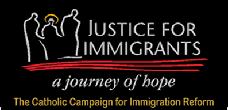Frequently Asked Questions
Why does the church care about immigration policies?
The Catholic Church has historically held a strong interest in immigration and how public policy affects immigrants seeking a new life in the United States. Based on Scriptural and Catholic social teachings, as well as her own experience as an immigrant Church in the United States, the Catholic Church is compelled to raise her voice on behalf of those who are marginalized and whose God-given rights are not respected.
The Church believes that current immigration laws and policies have often led to the undermining of immigrants’ human dignity and have kept families apart. The existing immigration system has resulted in a growing number of persons in this country in an unauthorized capacity, living in the shadows as they toil in jobs that would otherwise go unfilled. Close family members of U.S. citizens and lawful permanent residents must wait years for a visa to be reunited. And, our nation’s border enforcement strategies have been ineffective and have led to the death of thousands of migrants.
The Church has a responsibility to shine the message of God on this issue and help to build bridges between all parties so that an immigration system can be created that is just for all and serves the common good, including the legitimate security concerns of our nation.
Does the Catholic Church support illegal immigration?
The Catholic Bishops do not condone unlawful entry or circumventions of our nation’s immigration laws. The bishops believe that reforms are necessary in order for our nation’s immigration system to respond to the realities of separated families and labor demands that compel people to immigrate to the United States, whether in an authorized or unauthorized fashion.
Our nation’s economy demands foreign labor, yet there are insufficient visas to meet this demand. Close family members of U.S. citizens and lawful permanent residents face interminable separations, sometimes of twenty years or longer, due to backlogs of available visas. U.S. immigration laws and policies need to be updated to reflect these realties.
Does the Catholic Church support “amnesty”?
The Catholic bishops are proposing an earned legalization for those in this country in an unauthorized status and who have built up equities and are otherwise admissible. “Amnesty,” as commonly understood, implies a pardon and a reward for those who did not obey immigration laws, creating inequities for those who wait for legal entry. The bishops’ proposal is not an “amnesty.”
The Bishops’ earned legalization proposal provides a window of opportunity for undocumented immigrants who are already living in our communities and contributing to our nation to come forward, pay a fine and application fee, go through rigorous criminal background checks and security screenings, demonstrate that they have paid taxes and are learning English, and obtain a visa that could lead to permanent residency, over time.
Don’t the millions of illegals in this country pose a potential security threat? Shouldn’t we deport them?
The economic implications of such a proposition, both in terms of the costs of undertaking such an effort and the ramifications of losing so many millions of workers for which our economy is dependent, make it infeasible. The Catholic bishops believe, however, that by offering undocumented immigrants a legal path to permanent residency, they will come forward and make themselves known to authorities. For security purposes, it would be much better to know who these individuals are and to provide them an opportunity to come out of the shadows.
Our nation is in a war on terrorism; shouldn’t we be sealing our borders entirely?
The Catholic bishops believe, as do many others who have objectively studied the question of border enforcement, that no border enforcement strategy will be effective in keeping determined people out unless it is combined with policy changes that address the push and pull factors that compel immigrants to come here.
From 1993 to 2004, spending for border enforcement nearly quadrupled. Yet, the number of unauthorized arrivals increased. Moreover, U.S. border enforcement strategies have channeled migrants to more remote crossing points, resulting in increased fatalities, a growth in smugglers and traffickers, and reduced chances of apprehension.
Our nation’s security concerns would be better met by having an immigration system that allows well-intentioned immigrants the opportunity to enter in a more timely fashion through legal means, thereby allowing enforcement resources to be focused on would-be terrorists, smugglers and other criminals who would try to circumvent and manipulate the system to gain entry.

